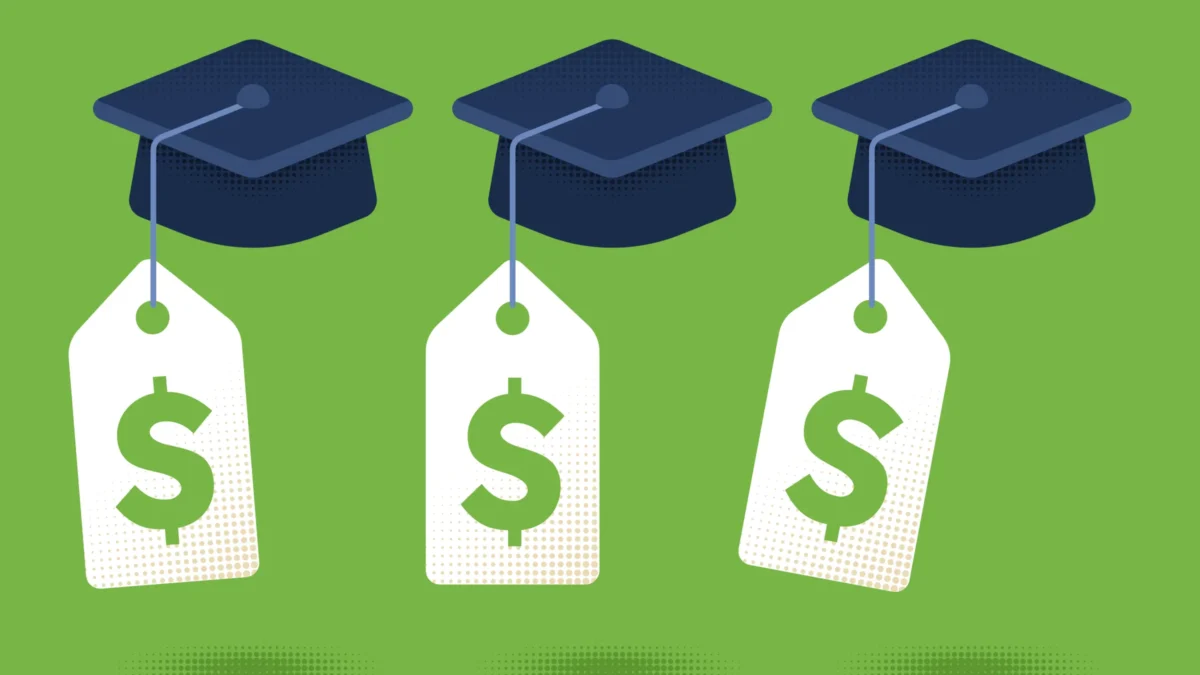
Oportun vs LendingClub: Which Company Offers the Better Loan Option?
October 4, 2025
How to Get a Personal Loan with Bad Credit in Ohio
October 9, 2025How to Pay Student Loan When Self-Employed: A Guide
Paying off student loans can be challenging for anyone, but when you’re self-employed, it comes with its own unique set of hurdles. Unlike a traditional 9-to-5 job, self-employment often means inconsistent income, fluctuating cash flow, and the responsibility of managing both personal and business finances. Balancing student loan payments while maintaining a stable business can feel overwhelming, but with the right strategies and planning, it’s entirely possible. In this guide, we’ll explore practical steps and options to help self-employed individuals manage and pay off their student loans effectively, even when income isn’t always predictable.
Introduction
- Briefly introduce the challenges of paying off student loans as a self-employed individual.
- Highlight the benefits and challenges of being self-employed when it comes to managing student loans.
- Mention that the post will explore practical strategies to tackle student debt while working for yourself.
Section 1: Understanding Your Student Loan Situation
- Assess Your Loan Type
- Federal loans vs. private loans.
- Income-driven repayment (IDR) plans for federal loans and the challenges with private loans.
- How loan servicers differ and their role in repayment options.
- Understanding Interest Rates & Terms
- The impact of fixed vs. variable rates on loan repayment.
- Why interest accrues faster if you’re not paying regularly.
Section 2: Create a Detailed Financial Plan
- Track Your Income & Expenses
- The importance of accurate accounting when you’re self-employed.
- Tips for using tools like QuickBooks or free spreadsheets for financial planning.
- Accounting for inconsistent income, seasonal earnings, and business expenses.
- Budget for Loan Repayments
- Setting aside money for student loan payments.
- Determining a monthly amount based on what you can afford while keeping your business afloat.
- The importance of maintaining a balance between personal finances and business health.
Section 3: Evaluate Repayment Plans for Self-Employed Individuals
- Income-Driven Repayment Plans (IDR)
- Explain how these plans work, especially for federal loans.
- Pros: Monthly payments based on income, potential for loan forgiveness after 20-25 years.
- Cons: May extend the loan term and result in more interest over time.
- Refinancing Your Loans
- What refinancing is and how it works.
- The pros and cons of refinancing for self-employed individuals.
- How to compare offers from lenders and get the best deal.
- When it makes sense to refinance and when it doesn’t.
- Paying More Than the Minimum
- How paying extra toward your loans can shorten the repayment period and save on interest.
- The importance of consistent extra payments even if they are small.
- Strategies for finding extra money: cutting unnecessary business or personal costs, reinvesting earnings, etc.
Section 4: Managing Tax Considerations for Self-Employed Borrowers
- Tax Deductions for Self-Employed Individuals
- How self-employed individuals can take advantage of tax deductions (e.g., business expenses, health insurance premiums).
- Ways these deductions can increase disposable income, which can be used to pay off loans faster.
- Tax benefits of contributing to retirement funds and how that impacts loan payments.
- Student Loan Interest Deduction
- Tax benefits of paying off student loans.
- Income limits and eligibility for student loan interest deduction.
- How to leverage this benefit when filing taxes.
Section 5: Special Considerations for Self-Employed Borrowers
- Managing Unpredictable Income
- How to handle months with inconsistent income.
- Creating an emergency savings fund to cover loan payments during dry spells.
- Setting a monthly payment minimum even during low-income months.
- Seeking Professional Help
- When and why to consult with a financial advisor or tax professional.
- How an advisor can help with optimizing student loan repayment strategies for the self-employed.
Section 6: Other Resources and Loan Forgiveness Programs
- Public Service Loan Forgiveness (PSLF)
- Eligibility for self-employed individuals working with qualifying organizations (non-profit, government, etc.).
- Steps to enroll and track progress for loan forgiveness.
- Income-Driven Repayment Forgiveness
- The role of IDR plans in loan forgiveness after 20-25 years of payments.
- Requirements for loan forgiveness and how self-employed individuals can qualify.
- State-Based Programs
- Overview of state-based loan forgiveness programs for self-employed workers, especially those in underserved professions.
- Resources for finding local programs.
Section 7: Stay Motivated and Consistent
- Celebrating Small Wins
- The importance of acknowledging milestones—whether it’s paying off a chunk of debt or reducing your loan principal.
- Staying motivated through the ups and downs of self-employment.
- The Long-Term Goal
- Remind readers that paying off student loans as a self-employed person is challenging but achievable.
- Focus on building a sustainable financial strategy to support the repayment plan.
Conclusion
- Recap the main strategies for self-employed individuals to manage student loan payments effectively.
- Encourage readers to stay proactive, consistent, and adaptable with their finances.
- Call to action: Remind them that the journey is long but attainable with the right planning and discipline.
FAQ: How to Pay Student Loans When Self-Employed
1. Can I qualify for income-driven repayment plans if I’m self-employed?
Yes, self-employed individuals can qualify for income-driven repayment (IDR) plans. These plans calculate your monthly payment based on your income, which can be beneficial when your earnings fluctuate. However, you’ll need to provide your tax return or proof of income to determine your eligibility.
2. How do I handle months when my income is lower than usual?
When you’re self-employed, income can be unpredictable. In months where earnings are low, consider making a smaller payment or deferring payment, if applicable. It’s crucial to stay in touch with your loan servicer to discuss possible temporary relief options. Having an emergency savings fund can help you cover loan payments during lean periods.
3. Is refinancing a good option for self-employed individuals?
Refinancing can be a good option if you have stable income and credit, as it may lower your interest rates and save you money over the long term. However, it’s important to weigh the pros and cons, as refinancing federal loans means losing access to certain benefits like IDR plans or loan forgiveness options.
4. Can I deduct student loan interest on my taxes if I’m self-employed?
Yes, you can deduct student loan interest on your taxes, up to a certain limit, if you’re self-employed. The student loan interest deduction allows you to reduce your taxable income by up to $2,500, depending on your income. Be sure to check eligibility based on your tax filing status and income level.
5. What are the best strategies for paying off student loans faster when self-employed?
To pay off your student loans faster, consider making extra payments when your income allows it. Paying more than the minimum, even if it’s a small amount, can significantly reduce your loan balance over time. Additionally, prioritizing high-interest loans can help save on interest. Always budget wisely and plan your payments around your income.
6. Is there a loan forgiveness program for self-employed borrowers?
Yes, self-employed individuals may be eligible for loan forgiveness through Income-Driven Repayment (IDR) plans, which can result in loan forgiveness after 20-25 years of qualifying payments. Additionally, certain public service jobs or non-profit work may qualify for Public Service Loan Forgiveness (PSLF), but you’ll need to meet specific criteria.
7. How can I stay on top of my student loan payments while managing my business finances?
Staying organized is key. Use accounting tools to track your income and expenses accurately, and allocate a portion of your earnings each month for loan payments. Creating a detailed financial plan and setting up automatic payments can help ensure that you’re consistently paying off your loans. It’s also essential to have a buffer for months when business is slower.
8. Should I consult a financial advisor for my student loan repayment strategy?
Yes, a financial advisor can provide valuable insights tailored to your self-employment situation. They can help you optimize your repayment strategy, assist with tax planning, and offer guidance on managing your loans alongside your business finances. A professional can also help you decide whether refinancing, consolidating, or enrolling in an IDR plan is the best option for you.
Read More:
- Oportun vs LendingClub: Which Company Offers the Better Loan Option?
- What credit score do you need for an RV loans in California
- Subsidized vs Unsubsidized Loans: What’s the Difference?
- Understanding Loans Based on Financial Need in the USA: Types and Options
- How to Get Approved for a Personal Loan in North Carolina




